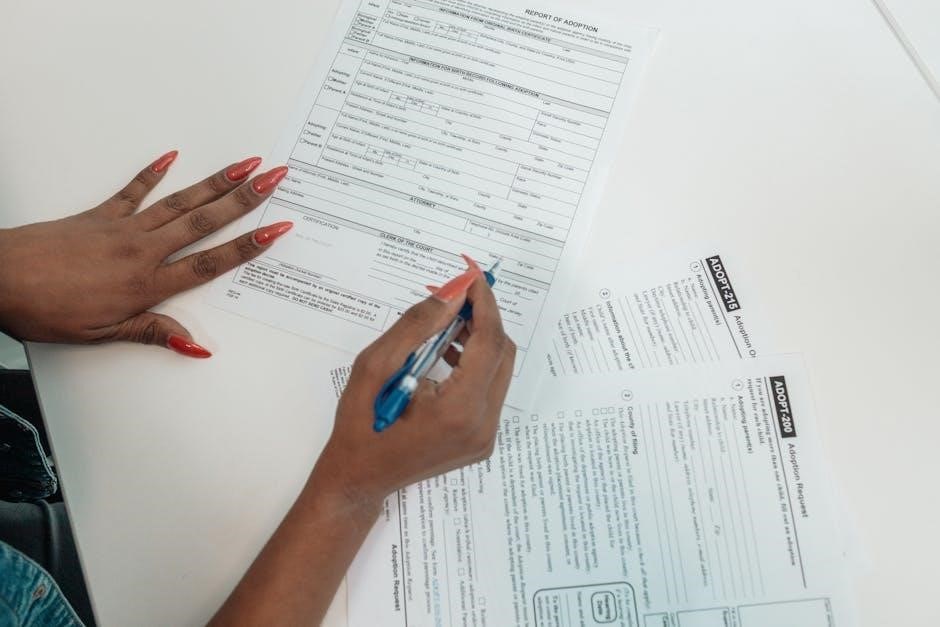Car Dealer Purchase Agreement Form: An Overview
A Car Dealer Purchase Agreement Form is a formal contract outlining the sale of a vehicle between a buyer and dealership․ This paperwork specifies the vehicle’s price, fees, description, and any warranties․ It’s a binding contract detailing the vehicle purchase․
Definition and Purpose
The Car Dealer Purchase Agreement Form is a legally binding document used by dealerships to finalize vehicle sales․ It serves as a comprehensive contract that outlines the terms and conditions agreed upon by both the buyer and the dealer․ This agreement details essential information such as the vehicle’s make, model, Vehicle Identification Number (VIN), agreed-upon purchase price, payment terms, and any warranties or guarantees offered․ Its purpose is to protect the interests of both parties by providing a clear record of the sale and preventing future disputes․ By signing, both parties acknowledge their understanding and acceptance of the terms․
Key Components of the Agreement
The car dealer purchase agreement includes vehicle details, purchase price, payment terms, and warranties․ These components protect both the buyer and seller by ensuring a clear understanding of the agreement’s terms․
Vehicle Details
This section of the car dealer purchase agreement form provides a comprehensive description of the vehicle being sold․ Key information includes the vehicle’s make, model, and year․ The Vehicle Identification Number (VIN) is also essential for unique identification․ Additionally, the agreement outlines the vehicle’s mileage, especially important for used cars․ Any existing damage or conditions should be clearly documented in this section․ This detailed description helps to prevent future disputes and ensures that the buyer is fully aware of the vehicle they are purchasing․ Accurate vehicle details are crucial for a transparent transaction․
Purchase Price and Payment Terms
The purchase price section explicitly states the agreed-upon cost of the vehicle․ This includes the base price, plus any additional fees such as taxes, registration, and dealer charges․ The payment terms outline how the buyer will pay for the vehicle․ This might involve cash, financing, or a trade-in․ If financing is involved, the interest rate, loan term, and monthly payment amount will be specified․ Trade-in details, like the value of the trade-in vehicle, are also included․ Clear payment terms ensure both parties understand their financial obligations, preventing misunderstandings later in the sales process․
Warranties and Guarantees
This section details any warranties or guarantees offered on the vehicle․ A warranty is a promise from the dealer or manufacturer to repair certain defects or malfunctions within a specified period․ The agreement outlines the duration and coverage of the warranty, specifying what parts and labor are included․ It also clarifies any exclusions or limitations to the warranty․ Guarantees, if offered, provide additional assurances about the vehicle’s condition or performance․ Understanding the warranties and guarantees is crucial for buyers, as it protects them against unexpected repair costs and ensures peace of mind after the purchase․

Importance of Reviewing the Agreement
Reviewing the Car Dealer Purchase Agreement is vital․ It ensures you understand all terms, preventing misunderstandings and protecting your interests․ Don’t sign anything you don’t understand․ It is a legally binding document․
Understanding All Terms and Conditions
Thoroughly understanding all terms and conditions within a Car Dealer Purchase Agreement is crucial before signing․ Ensure clarity on every aspect, including the vehicle’s price, additional fees, warranties, and payment terms․ Don’t hesitate to seek clarification from the dealer on any ambiguous clauses․ This agreement acts as a legally binding contract, so understanding all the details protects your rights and prevents potential disputes later․ Carefully review the fine print, and if needed, consult with a legal professional to ensure you are fully informed and protected throughout the transaction․
Customization and Modification
A Car Dealer Purchase Agreement can be customized to specific needs․ Tailoring the agreement ensures it accurately reflects agreed-upon terms․ Modifications should be documented and agreed upon by both parties before signing for clarity and legal protection․
Tailoring the Agreement to Specific Needs
To tailor the dealership agreement to specific needs, carefully review each section․ Consider aspects like extended warranties, specific vehicle conditions, and financing terms․ Modifications may include adding clauses for aftermarket accessories or agreed-upon repairs․ Ensure all changes are clearly written and understood by both the buyer and the dealer․ Customization should reflect the unique aspects of the sale, protecting both parties’ interests․ Any verbal agreements should be formalized in writing within the agreement․ This ensures transparency and reduces the risk of future disputes․ Tailoring the agreement creates a clear, legally sound document․

Where to Find Car Dealer Purchase Agreement Form Templates
You can find templates for car dealer purchase agreements through online legal resources and document providers․ Many websites offer free or paid templates that can be customized․ Always ensure the template aligns with local laws․
Online Resources and Examples
Numerous online resources provide car dealer purchase agreement form templates․ Websites like PandaDoc offer free, customizable templates that can be completed and signed online․ These platforms often include features for adding images, videos, and pricing tables․ Other legal template providers, such as LegalTemplates, also offer comprehensive agreements tailored for vehicle sales․ Ensure the template includes necessary details like vehicle information, purchase price, and payment terms․ Always review the template to ensure compliance with local laws and specific needs․ Examples of completed forms can also be found to guide you in filling out your own agreement accurately․

Differences Between Private Sales and Dealer Agreements
Dealer agreements are contracts used by car dealers to mark the sale of a particular vehicle․ Individuals who are buying or selling a vehicle privately, outside of a dealership, should use a vehicle purchase agreement․
Key Distinctions in Contractual Terms
When comparing private sales and dealer agreements, key distinctions emerge in contractual terms․ Car dealer agreements often include standardized language, warranties, and financing options․ Private sales may offer more flexibility in negotiation, but lack the consumer protections and established processes of dealerships․ Reviewing terms carefully is essential․ Dealer contracts are used by car dealers to mark the sale of a particular vehicle, while private sales require a vehicle purchase agreement outside of a dealership setting․ Understanding these differences protects both buyers and sellers during vehicle transactions․
Essential Documents Needed When Buying a Car
When buying a car, essential documents include the car purchase agreement, title, odometer statement, and sometimes a damage disclosure․ Get copies and understand everything before signing․ These documents ensure a transparent transaction․
Car purchase agreement (or dealer bill of sale), the title, an odometer statement, and sometimes a damage disclosure statement․
When finalizing a car purchase from a dealer, several key documents are involved․ The car purchase agreement, or dealer bill of sale, outlines the terms of the transaction․ The vehicle’s title transfers ownership to the buyer․ An odometer statement records the vehicle’s mileage accurately․ In some cases, a damage disclosure statement is required, revealing any known damage or issues with the vehicle’s history․ Review these documents carefully before signing․ Ensure you receive copies for your records․ Understanding these documents protects your interests as a buyer․

Legal Considerations and Protections
Ensuring a legally binding contract is crucial when using a car dealer purchase agreement form․ This protects both the buyer and seller, providing recourse in case of disputes and clear terms that are upheld in court․
Ensuring a Legally Binding Contract
To ensure a car dealer purchase agreement is legally binding, both parties must willingly agree to the terms outlined within the document․ The agreement needs to include a clear offer, acceptance, and consideration (usually the purchase price)․ All parties involved must have the legal capacity to enter into a contract, meaning they are of sound mind and legal age․ Any ambiguities or unclear language should be avoided to prevent future disputes․ Finally, the agreement should comply with all applicable state and federal laws․ A signed agreement indicates mutual understanding and acceptance of all terms, solidifying its legal validity․
